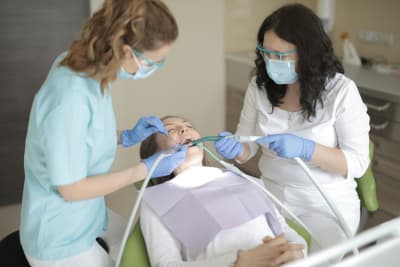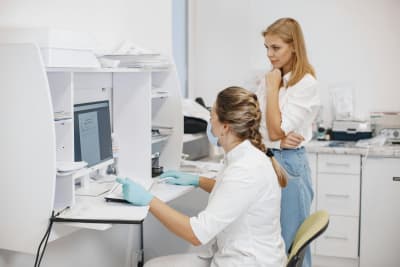The Bureau of Labor Statistics remains highly optimistic about the future employment of dental assistants in Minnesota and across the country. The Bureau expects employment figures to continue increasing every year and to be a stunning 10% year-on-year increase for the foreseeable future.
Readers of the page who happen to be prospective dental assistants in Minnesota will be glad to know that we have discussed everything they need to know to launch their careers properly below. We explore the preparatory steps to secure admission into a training program and the best training arrangements to consider depending on availability and desired award type.
We also analyze certification options and salary projections, among others.
How to Become a Dental Assistant in Minnesota
Candidates may follow the outlined approach below to launch a successful dental assistant career in Minnesota.
Step 1: Developing Transferable Skills
Minnesota dental assistants usually have a much better chance of succeeding on the job if they possess transferable skills. By these, we mean soft skills like analytical thinking, organizational skills, planning, and interpersonal skills.
Step 2: Identifying Suitable Programs
All dental assistant training programs teach technical topics to prepare candidates for success. However, candidates must ensure they choose the best option.
Usually, they will want to filter using criteria such as the possibility of hands-on education, curriculum makeup, and career services.
Of course, not all programs have the same completion time, and candidates may want to be particular about specific durations.
Step 3: Finishing a Program
Shorter dental assistant training programs may take a few months or a year to complete. In these cases, graduates will receive a certificate.
Associate degree programs are also available for prospective dental assistants. These programs last approximately two years or 18 months.
Step 4: Becoming Competitive
Gaining real-world experience even before securing a full-time job placement is an effective way to be competitive as a new dental assistant. This can be obtained through externships, which provide supervised practical experience.
Certification is another incredible approach to competitiveness. We discuss this particular topic further below.
Explore trades with similar paths:
Licensure & Certification Requirements
Minnesota is one of the few states in the country where dental assistants are expected to obtain a license. To do so, applicants must have graduated from an accredited training program and passed the Dental Assisting National Board examination.
The state also has a dental assistant licensing exam that professionals in the field must pass, along with a Jurisprudence exam. Proof of CPR certification and a criminal background check are also required.
The state expects candidates for radiography positions to show evidence of completing an approved program and passing the Dental Assisting National Board’s Radiation Health & Safety Examination.
Lastly, a dental assistant in Minnesota needs a year of experience in chairside assisting and a local anesthesia certification to administer local anesthesia.
Top Dental Assistant Schools in Minnesota
The entries below are considered to be among the best training programs for aspiring dental assistants in Minnesota.
Minneapolis College
Minneapolis, MN Campus Only
Minneapolis College offers two pathways for aspiring dental assistants: a Dental Assistant Core Certificate program and an Associate of Applied Science degree.
Tuition
$200 per CreditContact
(612) 659-6472
naomi.thomas@minneapolis.edu
Hennepin Technical College
Brooklyn Park, MN Campus Only
Hennepin Technical College offers both a Certificate and an Associate Degree program for dental assistants.
Email: tamara.erickson@hennepintech.edu
Tuition
$209 per CreditContact
(763) 488-2630
Email in Bio
Minnesota West Community & Technical College
Canby, MN Campus Only
Minnesota West Community & Technical College provides flexible enrollment options for dental assistant training. Students can choose between an Associate of Applied Science degree (60 credits, completed in 4 semesters) or a diploma program (48 credits, completed in 3 semesters).
Tuition
$3,246 per SemesterContact
(800) 658-2330
info@mnwest.edu
Explore dental assistant schools in Minnesota by city:
Salary & Career Outlook
Data shows that dental assistants in Minneapolis-Saint Paul, with an annual average salary of $117,127; Robbinsdale, with an annual average salary of $110,965; and Richfield, with an annual average salary of $103,056, take home the highest average salary in Minnesota. This shows just how important location is in deciding what a professional in the field makes for their efforts.
Minnetonka, with an average annual salary of $103,05, and Edina, with an average annual salary of $100,890, are also among the highest-paid.
However, without focusing on a single factor like location, dental assistants in Minnesota generally earn an annual average salary of $74,994 in the lower part of the salary spectrum and $126,109 in the upper part.
The majority, however, are right in the middle. The average annual salary for a dental assistant in Minnesota is $97,249.





